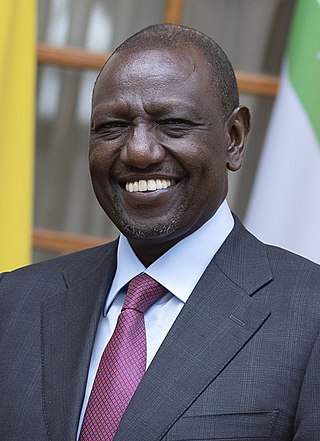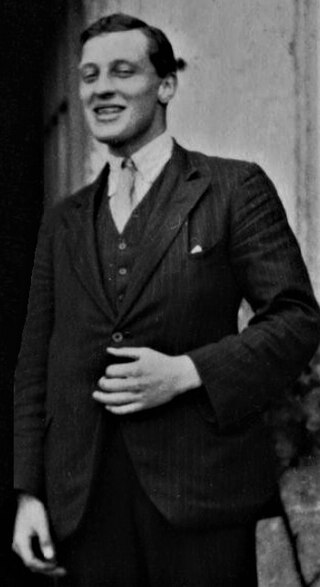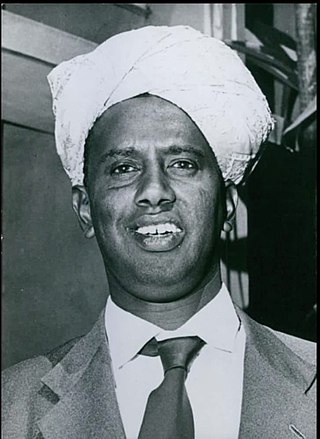
A part of Eastern Africa, the territory of what is known as Kenya has seen human habitation since the beginning of the Lower Paleolithic. The Bantu expansion from a West African centre of dispersal reached the area by the 1st millennium AD. With the borders of the modern state at the crossroads of the Bantu, Nilo-Saharan and Afro-Asiatic ethno-linguistic areas of Africa, Kenya is a truly multi-ethnic state. The Wanga Kingdom was formally established in the late 17th century. The kingdom covered from the Jinja in Uganda to Naivasha in the East of Kenya. This is the first time the Wanga people and Luhya tribe were united and led by a centralized leader, a king, known as the Nabongo.

The Kenya African National Union (KANU) is a Kenyan political party that ruled for nearly 40 years after Kenya's independence from British colonial rule in 1963 until its electoral loss in 2002. It was known as Kenya African Union (KAU) from 1944 but due to pressure from the colonial government, KAU changed its name to Kenya African Study Union (KASU) mainly because all political parties were banned in 1939 following the start of the Second World War. In 1946 KASU rebranded itself into KAU following the resignation of Harry Thuku as president due to internal differences between the moderates who wanted peaceful negotiations and the militants who wanted to use force, the latter forming the Aanake a forty, which later became the Mau Mau. His post was then occupied by James Gichuru, who stepped down for Jomo Kenyatta in 1947 as president of KAU. The KAU was banned by the colonial government from 1952 to 1960. It was re-established by James Gichuru in 1960 and renamed KANU on 14 May 1960 after a merger with Tom Mboya's Kenya Independence Movement.

The Mau Mau rebellion (1952–1960), also known as the Mau Mau uprising, Mau Mau revolt, or Kenya Emergency, was a war in the British Kenya Colony (1920–1963) between the Kenya Land and Freedom Army (KLFA), also known as the Mau Mau, and the British authorities. Dominated by Kikuyu, Meru and Embu fighters, the KLFA also comprised units of Kamba and Maasai who fought against the European colonists in Kenya, the British Army, and the local Kenya Regiment.

Jomo Kenyatta was a Kenyan anti-colonial activist and politician who governed Kenya as its Prime Minister from 1963 to 1964 and then as its first President from 1964 to his death in 1978. He was the country's first president and played a significant role in the transformation of Kenya from a colony of the British Empire into an independent republic. Ideologically an African nationalist and a conservative, he led the Kenya African National Union (KANU) party from 1961 until his death.

The president of the Republic of Kenya is the head of state and head of government of the Republic of Kenya. The president is also the head of the executive branch of the Government of Kenya and is the commander-in-chief of the Kenya Defence Forces. The country's current president is William Ruto since 13 September 2022.

The Kenya African Democratic Union (KADU) was a political party in Kenya. It was founded in 1960 when several leading politicians refused to join Jomo Kenyatta's Kenya African National Union (KANU). It was led by Ronald Ngala who was joined by Moi's Kalenjin Political Alliance, the Masai United Front, the Kenya African Peoples Party, the Coast African Political Union, Masinde Muliro's Baluhya Political Union and the Somali National Front. The separate tribal organisations were to retain their identity and so, from the very start, KADU based its political approach on tribalism. KADU's aim was to defend the interests of the so-called KAMATUSA as well as the British settlers, against the imagined future dominance of the larger Luo and Kikuyu that comprised the majority of KANU's membership, when it became inevitable that Kenya will achieve its independence. The KADU objective was to work towards a multiracial self government within the existing colonial political system. After release of Jomo Kenyatta, KADU was becoming increasingly popular with European settlers and, on the whole, repudiated Kenyatta's leadership. KADU's plan at Lancaster meetings was devised by European supporters, essentially to protect prevailing British settlers land rights.

Evelyn Baring, 1st Baron Howick of Glendale,, was Governor of Southern Rhodesia from 1942 to 1944, High Commissioner for Southern Africa from 1944 to 1951, and Governor of Kenya from 1952 to 1959. Baring played an integral role in the suppression of the Mau Mau rebellion. Together with Colonial Secretary Alan Lennox-Boyd, Baring played a significant role in the government's efforts to deal with the rebellion, and see Kenya through to independence. Baring was aware of abuses against Mau Mau detainees. He was elevated to being the 1st Baron Howick of Glendale in 1960.

Thomas Joseph Odhiambo Mboya was a Kenyan trade unionist, educator, Pan-Africanist, author, independence activist, and statesman. He was one of the founding fathers of the Republic of Kenya. He led the negotiations for independence at the Lancaster House Conferences and was instrumental in the formation of Kenya's independence party – the Kenya African National Union (KANU) – where he served as its first Secretary-General. He laid the foundation for Kenya's capitalist and mixed economy policies at the height of the Cold War and set up several of the country's key labour institutions. Mboya was Minister for Economic Planning and Development when he was assassinated.
The Lancaster House conferences were three meetings in which Kenya's constitutional framework and independence were negotiated.
The 1959 Hola massacre was a massacre committed by British colonial forces during the Mau Mau Uprising at a colonial detention camp in Hola, Kenya.
Caroline Elkins is Professor of History and African and African American Studies at Harvard University, the Thomas Henry Carroll/Ford Foundation Professor of Business Administration at Harvard Business School, Affiliated Professor at Harvard Law School, and the Founding Oppenheimer Faculty Director of Harvard's Center for African Studies.
The Kapenguria Six – Bildad Kaggia, Kung'u Karumba, Jomo Kenyatta, Fred Kubai, Paul Ngei, and Achieng' Oneko – were six leading Kenyan nationalists who were arrested in 1952, tried at Kapenguria in 1952–53, and imprisoned thereafter in Northern Kenya.

Indians in Kenya, often known as Kenyan Asians, are citizens and residents of Kenya with ancestral roots in the Indian subcontinent. Significant Indian migration to modern-day Kenya began following the creation of the British East Africa Protectorate in 1895, which had strong infrastructure links with Bombay in British India. Indians in Kenya predominantly live in the major urban areas of Nairobi and Mombasa, with a minority living in rural areas.

Kenya's 1963 Constitution, also called the Independence Constitution, was based on the standard "Lancaster House template" used for the former British colonies in Africa, was subject to early amendments, and was replaced in 1969.

Ali Adan Lord (1915-1961) became the first Somali MP and later the Interior Minister of Kenya. As Interior Minister, Lord included along with Jomo Kenyatta the state delegation that went to Mogadishu during President Sharmaake’s term.
Achhroo Ram Kapila, usually known as A.R. Kapila or Achhroo Kapila, was one of Kenya's pre-eminent criminal trial lawyers, representing a number of African leaders.
Dudley Joseph Thompson was a Jamaican Pan-Africanist, politician and diplomat, who made a contribution to jurisprudence and politics in the Caribbean, Africa and elsewhere internationally.
Ransley Samuel Thacker was a British lawyer and judge. Employed in the colonial service, he served as Chief Justice of St Vincent (1931–1933), Attorney General of Fiji (1933-1938), and as a judge in British Kenya. He is best known for the jailing of Jomo Kenyatta.
Dennis Akumu (1934-2016) was a Kenyan politician, trade unionist and independence freedom fighter. He was the first secretary general of the Organisation of African Trade Union Unity (OATUU).
Clement Michael George Argwings-Kodhek, also known as Chiedo Moa Gem Argwings-Kodhek, was a Kenyan attorney and politician. He served in the government and cabinet of Jomo Kenyatta, Kenya's first president, for six years, during which time he held the post of member of parliament for the Gem Constituency and the portfolios of Minister of Natural Resources and the Ministry of Foreign Affairs.








